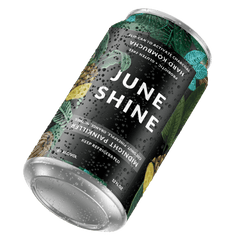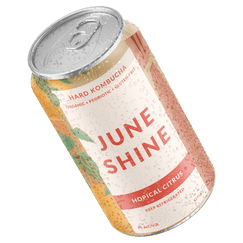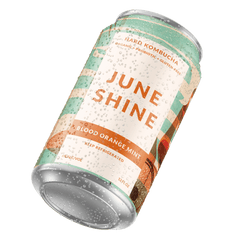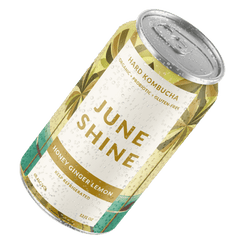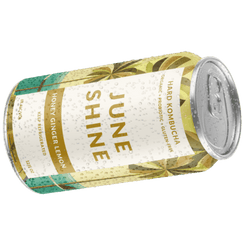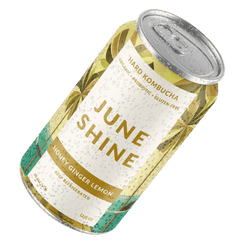Surprising Benefits of Kombucha for Your Body

Kombucha has been around for thousands of years and has even been called the Tea of Immortality. It should come as no surprise that traditional kombucha has tons of benefits for your body (and your taste buds).
From traditional kombucha to our hard kombucha, there’s a reason booch is so popular. Let’s get into it.
Kombucha’s Origin Story
Kombucha might be an old staple, but its origins are a mystery. Most kombucha lovers believe this fermented tea was created in China around 221 BC during the Qin Dynasty. That’s why World Kombucha Day falls on 2/21.
Others credit the name kombucha to a Korean doctor named Kombu, who brought the drink to Japan in 414, claiming it could boost immunity. Eventually, kombucha made its way from the Far East to western Europe.
Kombucha was surprisingly popular in Russia, becoming a Soviet Union staple. Grandmothers would give kombucha to their children and grandchildren because of its purported health benefits. Even prisoners would make it in their cells. People loved that it was tasty, easy to make, and good for digestion—we’ll drink to that.
How Kombucha Is Made
You only need three ingredients for a basic booch:
- Tea
- Sugar
- SCOBY
SCOBY is an acronym that stands for symbiotic culture of bacteria and yeast, and it’s what kicks the fermentation process into high gear. SCOBY is composed mostly of cellulose, but it also provides a home for other yeast and bacteria that are helpful for fermentation.
Kombucha needs to ferment for one to four weeks, and the length of fermentation affects booch’s flavors. The result should be a delicious fizzy drink that is slightly sweet.
To switch it up a bit, we use green tea instead of black tea and honey instead of black tea and sugar, two substitutes that make a world of difference when creating our smooth, drinkable hard booch.
Traditional vs. Hard Kombucha
Traditional kombucha is not an alcoholic drink, but it has a small amount of alcohol left from the kombucha fermentation process. We’re talking 0.5% or less, so it’s safe to say you won’t feel the buzz.
The key differences between traditional kombucha and hard kombucha stem from the brewing process. Hard kombucha requires a longer fermentation process—and sometimes even multiple rounds of fermentation.
More sugar and yeast are required to increase the alcohol content, but hard kombucha still has less sugar and carbs than other alcoholic beverages. The majority of this sugar disappears during fermentation, leaving a dry alcoholic drink with a low sugar content.
The Benefits of Kombucha
One of the reasons this fermented tea has remained so popular is because of the purported health benefits of kombucha. Research is still limited, but traditional kombucha may help support digestion, provide an energy boost, support your immune system, and assist in removing toxins.
Probiotic Power
Kombucha produces probiotics during fermentation, and they keep the bacteria in your body in check. The word bacteria gets a bad rap, but there are healthy bacteria and bad bacteria. The probiotics in traditional kombucha help the gut balance these two strains of bacteria, supporting the drinker’s gut health.
The microbiome is a community of trillions of fungi, bacteria, and viruses called microbes that live in our bodies. Most of them are in our intestines and our skin.
Microbes can either bring disease or help us thrive. For example, an imbalance of microbes in your gut can lead to weight gain, but good bacteria can prevent harmful microorganisms from sticking to the intestines. Maintaining a balanced microbiome through probiotics can have a major impact on your overall wellness.
Fermentation Benefits
The compounds found in fermented foods and drinks break down phytates and lectins, which interfere with nutrient absorption, to help us get the most out of our foods. We’re not going to get too deep into the food science aspect, but foods like sauerkraut, kimchi, and yogurt, and drinks like kefir and traditional kombucha can help you get the most nutrition out of your food.
Vitamins and Antioxidants
Traditional kombucha is also rich in vitamin B-12, which can provide an energy boost.
The green tea that kombucha is sometimes made with is loaded with polyphenols and other antioxidants. These antioxidants are a key element of the fight against free radicals, which can wreak havoc on our bodies—and speed up aging. That’s why so many tea drinkers swear by green tea.
Follow Your Gut
Traditional kombucha may be good for your body, but hard kombucha is good for the soul.
At JuneShine, we’re all about transparency in our fermentation processes, values, and ingredients. That means you can expect high-quality, organic booch with no surprises. Each can is refreshing but not too sweet, made with real fruit juice.
Sure, it’s good for you and the environment, but it has to taste good, too. We’re always creating exciting new flavors, and our current pick is Blood Orange Mint—it tastes like a soothing sip of sunshine.
Sources:
2,000 years of kombucha: A very brief history of the world’s favorite fermented drink | vox
Kombucha SCOBY: What It Is and How to Make One | Healthline
What Is SCOBY and How to Make Your Own Kombucha | Green Matters
What is Hard Kombucha? Is Hard Kombucha Healthy? | Health Aide
Kombucha - Ingredients, Health Benefits, and Risks | Web MD
Food Fermentation: Benefits, Safety, Food List, and More | Healthline
Green Tea vs. Black Tea: Which Is Healthier? | Healthline
Why the Gut Microbiome Is Crucial for Your Health | Healthline